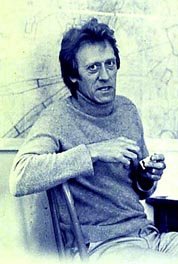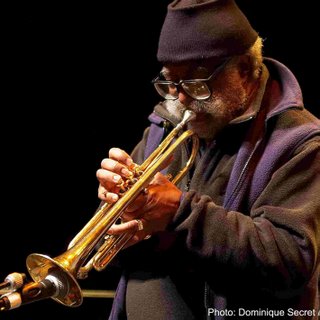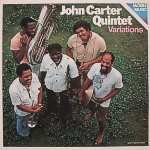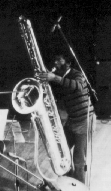
first, some congratulations...
to Aa on the release of their first full-length, "gAame," on Gigantic Music. it sounds and looks amazing, as you can see above. yes, i am biased, but so are most people.
to Birthday Boyz, Animal and the Fugue for putting on a deadly triple bill last night. inspiring and bar-raising performances all 'round.
*****

second, a few recommendations.
the man you see above embarrassed me in front of my mother and extended family on Saturday night... and i loved it!!! no, but seriously folks, this guy, Simon Lovell, puts on a hell of a show (Simon Lovell's Strange and Unusual Hobbies).
how i ended up there is a long and convoluted tale, but suffice it to say that me, my mom, my uncle, my cousin, my aunt and some of her friends were on this behind-the-scenes theater tour for my aunt's b-day and the owner of the Soho Playhouse told us about this show that goes on every Saturday in the basement (called the Huron Club). i may be getting some of the facts wrong, but essentially Simon Lovell is a sleight-of-hand expert--apparently one of the most fearsome cardsharps in the world. the guy at the theater told us that legerdemain dudes from all over the world frequently show up and sit in the front row to observe this guy's technique. so this show is basically just a demonstration of his techniques, with a huge dose of sarcastic comedy.
so the club is really tiny and Lovell's right there in front of you. he's incredibly lewd--i recall a crack about my aunt's pubic hair; uh, awkward!--and sarcastic. there's a lot of ribbing of and interaction with the audience and you're pretty much on edge the entire time b/c you're worried Lovell's going to pick on you. (he told me my sideburns looked like hamsters on the sides of my face.) but it's all in good fun and the show is riveting. he demonstrated various methods of trick dealing, including one where he can deal out six poker hands and stack all the aces in whichever hand he wants.
there was also an amazing trick where he had these four wooden coasters, one of which had a sharp metal spike sticking out of it. he asked my aunt to cover each of them with styrofoam cups and mix them up while he told us a story about how this game had been used to punish cheaters at the Huron Club when it was a Tammany Hall hangout. basically the cheater could either have one of his fingers cut off or he could take his chances slamming his hand down on one of the cups, having a one in four chance of skewering himself and ending his card-playing career.
so anyway, Lovell's talking as my aunt is arranging the coasters and when she's done he turns around and slams his hand down on one of the cups. this happens thrice and of course he doesn't skewer himself (were the coasters marked or something? i really dunno) but it was some seriously harrowing shit. the precariousness of the whole night was heightened by the fact that this guy is performing with a cast on one arm.
there's a bunch of other stuff as well, including Lovell reading silly newspaper clips and discussing his former career as a con man (apparently he's gone straight and now works as a criminal profiler for the CIA). it was amazing to me how this guy could hold a stage all by himself for 90 minutes. his personality is hilarious: he's this lanky British dude w/ glasses and he just drips with sarcasm; but there's a weird warmth behind it all. he's not simply a dick. i read on his website that he does corporate performances and it makes me wonder how much he tones his act down for that sort of thing.
at any rate, this is simply a fun, unusual diversion and i'd recommend it to anyone. link is way up there. show is on Saturday nights in that sort of nether-region between the West Village, Soho and Tribeca.
*****
two documentaries viewed recently w/ Laal that i'd recommend...
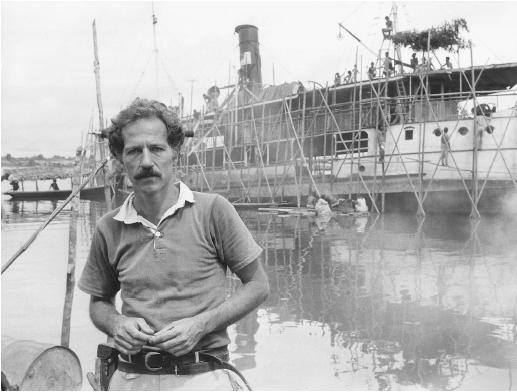
first is My Best Fiend (i'm going to experiment w/ not putting quotes around titles; it's not like you can't tell when something is one...), made by Werner Herzog a few years back. Herzog is very easily one of my favorite filmmakers, maybe in my top three next to Altman and Ross McElwee (hail). i haven't seen anywhere near all his films, but one thing i've determined is that i'm much more into his documentaries than his fiction films.
i'm not exactly sure why this is. i think as a fiction filmmaker he's much more into mood-setting than storytelling. for me, Aguirre, Fitzcarraldo and The Enigma of Kaspar Hauser are all very interesting, but not spectacularly so. they're like these mood pieces, character studies what have you. they're all sort of a bunch of different variations on a single theme. there's a narrative arc in all those movies but it's secondary to the minute psychological progress of the character.
in the docs, you get to see behind the scenes of that analytical process. basically you can tell from watching the fiction films that Herzog is a really smart guy, but when you listen to him narrate--as he does in all the docs of his i've seen--you really feel his genius in a very immediate way. i guess to me his greatest quality is his fascination with huge variety of subjects and his willingness to take even the most esoteric situations seriously and to give them the care and research they deserve. Grizzly Man is an obvious masterpiece, as is Herdsmen of the Sun, which is about this unbelievably strange tribal ritual in Africa where the men dress up and primp for the women. there's a Herzog doc fest coming to Film Forum, and i strongly encourage you to see Herdsmen there.
anyway, My Best Fiend is about Herzog's love/hate relationship w/ the notoriously insane actor Klaus Kinski. it charts their collaboration through Aguirre, Fitzcarraldo, Woyzeck, Nosferatu and Cobra Verde. a lot of the movie is Herzog revisiting the remote jungle locations where those first two were filmed. he'll just sit there and reminisce but it's very deep and poignant. basically you come away with this idea that their relationship was really a kind of art project. they fought and fought and even tried to murder each other, but they had some sort of tacit understanding that the films were more important than their personal beefs.
Kinski was clearly a force of nature and it's obvious that his tirades have left a big impression on Herzog. he visits an old apartment where they lived together and recalls Kinski throwing a baked potato in the face of a visiting theater critic. when Herzog visits actors who once worked with Kinski they too are still shaken up by shoots that happened decades ago. many of the women recall Kinski as a tender man while one of the extras from Aguirre recalls Kinski denting his head with a rifle butt. so, a pretty complex character.
one thing that fascinated me in particular was the footage of Kinski's so-called "Jesus tours," where apparently he would simply get up on stage (looking like an unhinged glam-rocker) and command the audience to worship him, berating them when they'd disobey. some completely insane shit. here's the clip for your viewing pleasure:
and here is a really fun clip of Henry Rollins (!) interviewing Herzog. i love how totally studious and serious Rollins is on his TV show. he's actually really good at striking up camaraderie, from what i've see. anyway, this is a great intro to what a warm, smart guy Herzog is:
*****

the other doc we watched is Keep the River on the Right. it was subtitled a "modern cannibal tale," but this turned out to be really sensationalistic. basically what it was was a portrait of a really wonderful old dude named Tobias Schneebaum, whom you see above. basically he grew up in NYC and became a painter. in the '50s, he won a Fulbright scholarship and decided to go to Peru and seek out a primitive tribe, just for his own edification. he didn't really know where he was going but he ended up immersing himself in a cannibal society (i.e., he did indeed partake) for many months. he spent much of his life engaged in adventures of this sort and developed a deep bond not only w/ the Peruvian tribe but with a similar one in New Guinea. basically the film is about him revisiting these remote places after many decades.
Schneebaum is a really sensitive, intelligent dude and though the film is sort of scatter-brained and not totally pro-seeming in all spots, this dude is riveting to watch throughout. he's really open about his homosexuality--he revisits a New Guinea tribesman who was his lover years ago--and is remarkably sincere about his reasons for doing this sort of traveling. it's weird b/c his current job is giving tours of these remote regions for rich people, and it's just really crazy to see someone who was engaged with these cultures on such a deep level having to dumb down all the info for a bunch of tourists. you can see that one of the great struggles of his life has been to convince people that the tribes he lived with weren't savage brutes. there's crazy footage of TV interviews (one memorable one w/ Charlie Rose) where the hosts are getting on his case for forming sexual relationships with the tribesmen and engaging in cannibalism. he doesn't apologize for anything; his philosophy is that he was simply following the customs of the societies where he was living.
the reunion scenes are devastating. he goes back to these remote places where he hasn't been in decades and there are still tribesmen who recognize him. it's just incredibly intense to see him reunited with these people who he'd never thought he'd see again and whom he almost certainly will not see again. you can tell that he feels like he really belongs in these places but that New York is his home for better or for worse. watch this one but not for the sensational aspect. it's touching rather than shocking.
*****
Andrew Hill recommendation: you have to hear the big-band disc A Beautiful Day if you haven't. beautiful, sweeping stuff. this is truly one of the deepest discs he ever released. completely smokes Passing Ships, which IMHO is pretty overrated.




